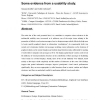1219 search results - page 242 / 244 » Adaptive Natural Language Interaction |
104
click to vote
EXPERT
2006
14 years 11 months ago
2006
abstraction rules that hide the complexity of systems of components. We've begun this process in the domain of sensor/actuator network applications, observing that in manyappl...
100
click to vote
CORR
2007
Springer
14 years 11 months ago
2007
Springer
The main aim of the work presented here is to contribute to computer science advances in the multimodal usability area, in-as-much as it addresses one of the major issues relating...
110
click to vote
UMUAI
2008
14 years 11 months ago
2008
We explored the reliability of detecting a learner's affect from conversational features extracted from interactions with AutoTutor, an intelligent tutoring system that helps...
SIGSOFT
2001
ACM
16 years 14 days ago
2001
ACM
Prior research in software environments focused on three important problems-- tool integration, artifact management, and process guidance. The context for that research, and hence...
117
click to vote
SPAA
2009
ACM
16 years 9 days ago
2009
ACM
Thread-level speculation (TLS) is a technique that allows parts of a sequential program to be executed in parallel. TLS ensures the parallel program's behaviour remains true ...

